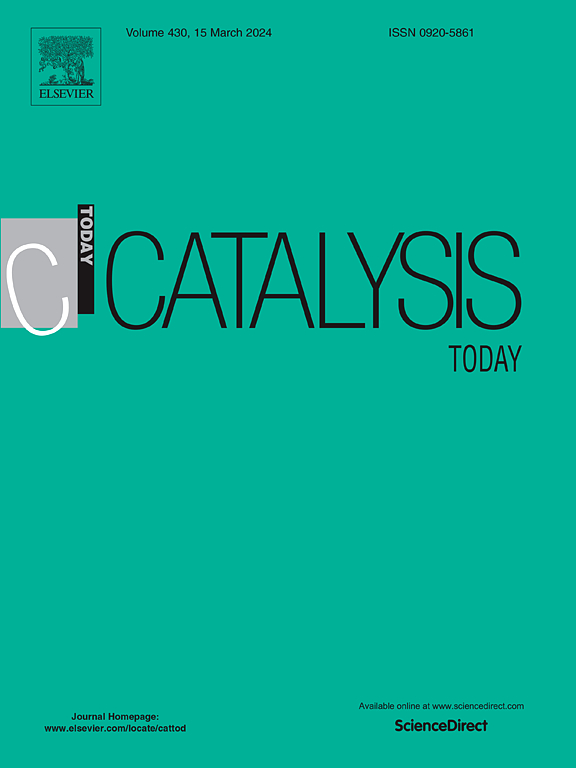Influence of zeolite hydrophilicity and hydrophobicity on water-assisted polyethylene hydrocracking
IF 5.3
2区 化学
Q1 CHEMISTRY, APPLIED
引用次数: 0
Abstract
The catalytic upcycling of polyethylene (PE) remains a major challenge in sustainable waste management. This study demonstrates that water promotes PE hydrocracking over Ru/zeolite catalysts only when the support framework is strongly hydrophilic, as in HY and HMOR. Systematic characterization reveals that this promotional effect is governed by surface wettability, rather than acidity or metal dispersion. Thermodynamic analysis confirms that water and PE are immiscible under reaction conditions, ruling out direct water–polymer interactions. Instead, water preferentially associates with hydrophilic catalyst surfaces, promoting Brønsted acid activity through confined hydration. Controlled experiments show that direct contact between water and the catalyst is essential for enhanced reactivity; spatial separation between the two leads to suppressed conversion, likely due to unfavorable interactions between water and the molten polymer. These findings highlight the mechanistic role of interfacial water–catalyst accessibility and establish catalyst hydrophilicity as a key design parameter for reliable and efficient water-assisted hydrocracking. The results have practical implications for processing moisture-containing plastic waste streams.
沸石亲疏水性对水助聚乙烯加氢裂化的影响
催化聚乙烯(PE)的升级回收仍然是可持续废物管理的主要挑战。该研究表明,只有在支持框架具有强亲水性的情况下,如HY和HMOR,水才能促进Ru/沸石催化剂上PE的加氢裂化。系统表征表明,这种促进作用是由表面润湿性决定的,而不是酸度或金属分散。热力学分析证实,在反应条件下,水和PE是不可混溶的,排除了水与聚合物直接相互作用的可能性。相反,水优先与亲水性催化剂表面结合,通过受限水合作用促进Brønsted酸活性。对照实验表明,水与催化剂的直接接触是提高反应活性的必要条件;两者之间的空间分离导致抑制转化,可能是由于水和熔融聚合物之间不利的相互作用。这些发现强调了界面水-催化剂可及性的机理作用,并将催化剂亲水性作为可靠、高效的水助加氢裂化的关键设计参数。该结果对处理含湿塑料废物流具有实际意义。
本文章由计算机程序翻译,如有差异,请以英文原文为准。
求助全文
约1分钟内获得全文
求助全文
来源期刊

Catalysis Today
化学-工程:化工
CiteScore
11.50
自引率
3.80%
发文量
573
审稿时长
2.9 months
期刊介绍:
Catalysis Today focuses on the rapid publication of original invited papers devoted to currently important topics in catalysis and related subjects. The journal only publishes special issues (Proposing a Catalysis Today Special Issue), each of which is supervised by Guest Editors who recruit individual papers and oversee the peer review process. Catalysis Today offers researchers in the field of catalysis in-depth overviews of topical issues.
Both fundamental and applied aspects of catalysis are covered. Subjects such as catalysis of immobilized organometallic and biocatalytic systems are welcome. Subjects related to catalysis such as experimental techniques, adsorption, process technology, synthesis, in situ characterization, computational, theoretical modeling, imaging and others are included if there is a clear relationship to catalysis.
 求助内容:
求助内容: 应助结果提醒方式:
应助结果提醒方式:


